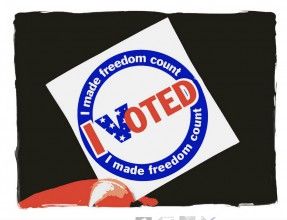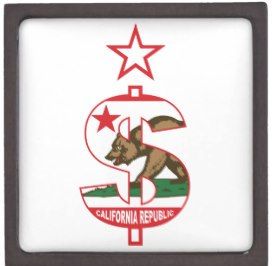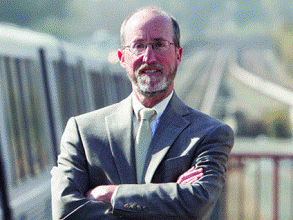CA campaign reporting threshold could double
by John | March 27, 2015 10:53 am
 It could soon be harder to follow the money in California politics.
It could soon be harder to follow the money in California politics.
A state lawmaker wants to double the reporting threshold for political campaigns in California — allowing major donors to contribute more money and campaigns to spend more money before filing a disclosure report.
Under the Political Reform Act of 1974, as modified by later laws, candidate and independent expenditure committees must file disclosure reports after accepting $1,000 or more in a calendar year. Similarly, the state requires major donors to file campaign reports after contributing $10,000 or more in a calendar year.
Assemblyman Richard Gordon[1], D-Menlo Park, believes it’s time to increase those disclosure limits. Assembly Bill 594[2] would require candidate and independent expenditure committees to file a disclosure report after spending $2,000 or more in a calendar year. The reporting threshold for major donors would increase from $10,000 to $20,000 or more.
Political amateurs punished by campaign finance laws
Since his election to the state Assembly in 2010, Gordon has carved out a special niche in campaign finance legislation with bills to increase regulation and disclosure requirements. In 2012, Gordon authored Assembly Bill 481[3], which added new reporting requirements for independent expenditure and major donor committees. Last year, Gov. Jerry Brown signed Gordon’s bill, Assembly Bill 800[4], to give the Fair Political Practices Commission “the authority to conduct immediate audits when political campaigns are suspected of illegal activity and requires subcontractors and sub-vendors to disclose their donations.”
State-level political campaigns continue to be big budget blockbusters. According to the Sacramento Bee’s analysis of campaign finance[5] reports, “candidates and independent groups collectively spent at least $150 million on Assembly and Senate contests statewide over the two-year election cycle.”
Why would a Democratic politician with a record of authoring campaign finance laws seemingly aid money in politics? Like his previous campaign finance proposals, Gordon’s current legislation has support from the state’s campaign watchdog, which argued that low campaign spending limits reduce political participation.
In a memo obtained by the Los Angeles Times[6], Erin Peth, executive director of the FPPC, said that the current campaign finance rules “can be a barrier for those individuals who wish to participate, but who will not be raising or spending large amounts of money in connection with an election.” Peth also argued, “Committee qualification thresholds have not been updated since at least 1987 and the proposed increases in the bill are intended to adjust the thresholds with the rate of inflation.”
According to the Inflation Calculator[7] of the U.S. Bureau of Labor Statistics, when adjusted for the rising in the cost of living, $1,000 in 1987 is the equivalent of $2,066 today.
The rationale for higher limits is supported by pro-freedom campaign finance experts, who strongly defend political contributions as a protected form of political speech. Complex campaign finance laws force average citizens to seek legal counsel before engaging in political organizing.
“While serving on the FEC from 2000 to 2005, I kept a file of letters from political amateurs caught in the maw of campaign-finance laws,” Bradley Smith, a law professor and former chairman of the Federal Election Commission, wrote in 2007[8]. “Many of these people had no lawyers; none had the least intent to corrupt any officeholder; and all thought that they were fulfilling their civic duty by their involvement in campaigns.”
Top Two Primary could lead to more low-budget upsets
A higher campaign reporting threshold also increases the chances that those amateurs turn pro. Aided by California’s Top Two primary[9], which was passed by state voters in 2010, unknown candidates have been able to exceed political expectations, even achieve remarkable upsets, with low-budget campaigns. With higher reporting levels, these candidates will be able to operate in the dark for longer without tipping off incumbents.
 Last November, unknown community activist Patty Lopez failed to report any expenditures[10] in the primary campaign, despite spending a few thousands dollars. That failure to report resulted in a $400 fine[11] by the FPPC. In the general election, she went on to upset fellow Democrat, Asm. Raul Bocanegra.
Last November, unknown community activist Patty Lopez failed to report any expenditures[10] in the primary campaign, despite spending a few thousands dollars. That failure to report resulted in a $400 fine[11] by the FPPC. In the general election, she went on to upset fellow Democrat, Asm. Raul Bocanegra.
“I made a few mistakes, and I paid the price for that,” Lopez said after the election[12]. “Most of the people on my team, we’re not in the political arena.”
Lopez’s campaign finances weren’t managed by a campaign professional, just a family friend who was willing to serve as treasurer. That’s exactly the type of grassroots campaign political watchdogs hope to encourage with relaxed campaign finance regulations.
Her victory is proof that low-budget long-shots have the potential to win. Although it’s unlikely that Bocanegra would have been intimidated by a few thousands dollars of campaign spending, some political observers believe the lack of campaign finance disclosure contributed to the perception that she wasn’t a serious threat[13].
Opportunity for political professionals to exploit
 By aiding political amateurs with higher reporting levels, state regulators also could empower creative political professionals to exploit the outcome of primary races. In multi-candidate primary elections, political professionals could spend just under $2,000 in online ads or automated calls backing a decoy candidate.
By aiding political amateurs with higher reporting levels, state regulators also could empower creative political professionals to exploit the outcome of primary races. In multi-candidate primary elections, political professionals could spend just under $2,000 in online ads or automated calls backing a decoy candidate.
Such a scenario has already played out in this year’s special election for the 7th State Senate District. A Democrat-led political action committee, the Asian American Small Business PAC, spent $46,380 on behalf of Michaela Hertle[14], a Republican candidate who had dropped out of the race.
By backing the lone Republican candidate, the political action committee hoped to thwart moderate Democrat Steve Glazer, who had built his campaign strategy on appealing to Republicans and independent voters. Glazer ultimately advanced to the May run-off against fellow Democrat, Assemblywoman Susan Bonilla. But Hertle had an impact, garnering 15 percent[15] of the vote.
- Richard Gordon: http://asmdc.org/members/a24/about/biography/biography
- Assembly Bill 594: http://leginfo.ca.gov/pub/15-16/bill/asm/ab_0551-0600/ab_594_bill_20150224_introduced.htm
- Assembly Bill 481: http://asmdc.org/members/a24/news-room/press-releases/gordon-bills-to-take-effect-on-january-1-2013
- Assembly Bill 800: http://losangeles.cbslocal.com/2014/04/03/gov-brown-signs-bill-to-strengthen-campaign-finance/
- Sacramento Bee’s analysis of campaign finance: http://www.sacbee.com/news/politics-government/capitol-alert/article9360284.html
- Los Angeles Times: http://www.latimes.com/local/political/la-me-pc-state-panel-may-support-raising-thresholds-for-campaign-reporting-20150309-story.html
- Inflation Calculator: http://www.bls.gov/data/inflation_calculator.htm
- wrote in 2007: http://www.wsj.com/articles/SB118290892610549503
- Top Two primary: http://ballotpedia.org/California_Proposition_14,_Top_Two_Primaries_Act_%28June_2010%29
- failed to report any expenditures: http://www.calnewsroom.com/2014/11/10/state-assembly-39-explaining-patty-lopezs-potential-upset-of-asm-raul-bocanegra/
- fine: http://www.fppc.ca.gov/agendas/2014/08-14/08%20Lopez%20-%20Stip.pdf
- after the election: http://www.latimes.com/local/politics/la-me-pol-bocanegra-lopez-20141125-story.html
- wasn’t a serious threat: http://www.calnewsroom.com/2014/11/10/state-assembly-39-explaining-patty-lopezs-potential-upset-of-asm-raul-bocanegra/
- behalf of Michaela Hertle: http://www.contracostatimes.com/breaking-news/ci_27590502/democratic-leaning-asian-american-pac-spends-white-republican
- garnering 15 percent: http://www.sos.ca.gov/elections/prior-elections/special-elections/2015-sd7/election-results-primary
Source URL: https://calwatchdog.com/2015/03/27/ca-campaign-reporting-threshold-could-double/